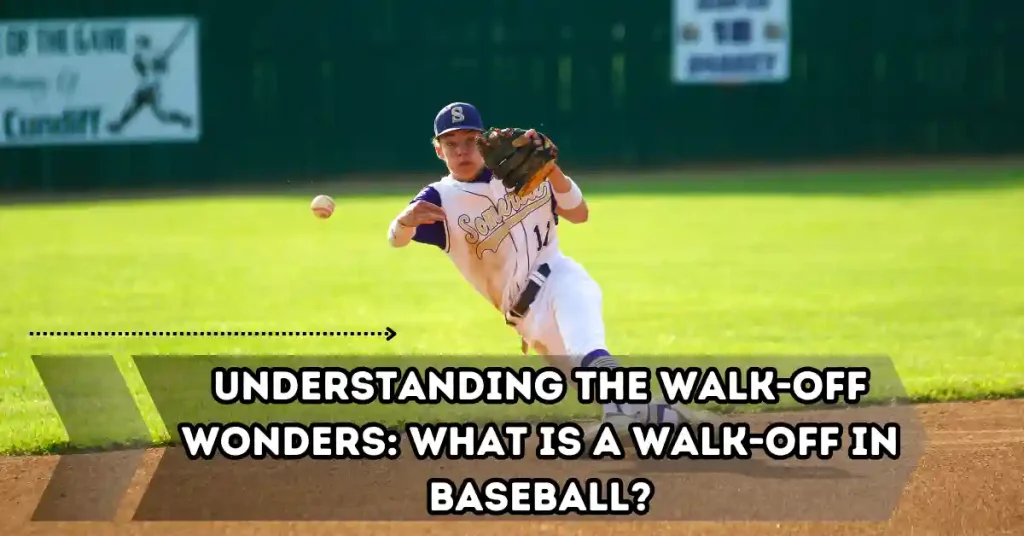
Walk Off in Baseball:
What is a walk-off in baseball? Walk-off baseball is a situation when the team batting in the lower half of the final inning, usually in the 9th inning, scores a home run or base hit, anything that puts them in the lead compared to their opposing team, and the game ends immediately. It refers to players walking off the field after scoring the winning runs in the final play. The last inning is usually played by the home team. If the home team hits a home run and outscores the visiting team, the game would end immediately, causing the players to “walk off” the field. check out this article.
Baseball Walk off Situations:
A baseball walk off takes place when players “walk-off” the field after scoring the walk off run. This can happen as a result of the following situations:
Walk off hit:
What is a walk off hit? When the batter hits a single, double, or walk off home run, that can lead to a winning run, ending the game. An example of a walk off hit in baseball can be when a batter and runners get a chance to score after hitting the ball out of the field; this will cause a walk off home run. Walk-off moments like these showcase the excitement of baseball, often seen in major events like the Summer Olympics.
Walk off walk:
walk off walk occurs when a batter is given four balls while the three bases are loaded with runners, and the runner on the third base scores the winning run, ending the game. Equipment like bat rolling has also influenced discussions on performance in crucial moments.
Walk off mistake:
A walk off also takes place due to a fielding or defensive mistake from the opposing team, which can lead to scoring the winning run and ending the game.
What makes a walkoff so thrilling?
Baseball Walk offs are thrilling as they add an interesting touch to the game. These are a few reasons why walk off baseball can be thrilling for fans:
Unexpected win:
Since the home run walk off or any other walk offs immediately ends the game, it might be a moment of intrigue and shock for the fans when the team surprisingly scores a winning run, ending the game unexpectedly. For a better understanding of game dynamics, check out how long is a baseball game.
Intense pressure:
There could be intense pressure on both teams when the game reaches its end. This intense pressure could lead to a walk off hit. In such intense behavior, any single or double hit can make a huge difference.
Emotional significance:
The home run walk off can result in an emotional reaction from the fans as well as the players and the team. It emphasizes the achievement and win of the winning team and the loss of the losing team, making the game interesting. The emotional connection between fans and their favorite players often resonates strongly, similar to moments in fantasy baseball.
Home team benefits:
The home team usually benefits from walk offs since they usually get the chance to play the last inning and score a winning run, which can end the game immediately. This can be possible due to home-field advantages and local fan support. Iconic players like Andrew McCutchen have often shined in such moments.
Unpredictability:
the walk win Baseball can add certain intrigue and unpredictability to the game, which can make the game interesting and keep the fans hooked.

Famous baseball walk off moments in history:
Bobby Thompson’s “Shot Heard ‘Round the World” (1951)
During the national league final game between the Network Giants and Brooklyn Dodgers on October 3rd, 1951,
It is one of the most famous walk offs in the history of baseball, and it became known as “Shot Heard ‘Round the World”.
It took place when Bobby Thomson of the Giants hit a three-run homer off Ralph Branca when the Giants were behind by two runs. This is the perfect walk off home run definition.
Conclusion:
Walk off is a situation that might decide the fate of the game and turn the entire game upside down. It can put the team behind on score ahead and the team that was winning behind. It can highlight the team effort that it takes to score a walk-off.
FAQS:
Are walk-off home runs common in matches?
Walk off runs in baseball matches occur occasionally and are not that common. They usually occur during intense pressure matches.
Why are walk offs considered intense moments of the game?
Walk offs in baseball are considered intense moments of the game as they add intrigue and a dramatic touch to the game by giving unexpected outcomes.
What is the impact of walk off on the teams in baseball?
Walk off highlights the achievement of the winning team and the frustration and mistakes of the opposing team.
